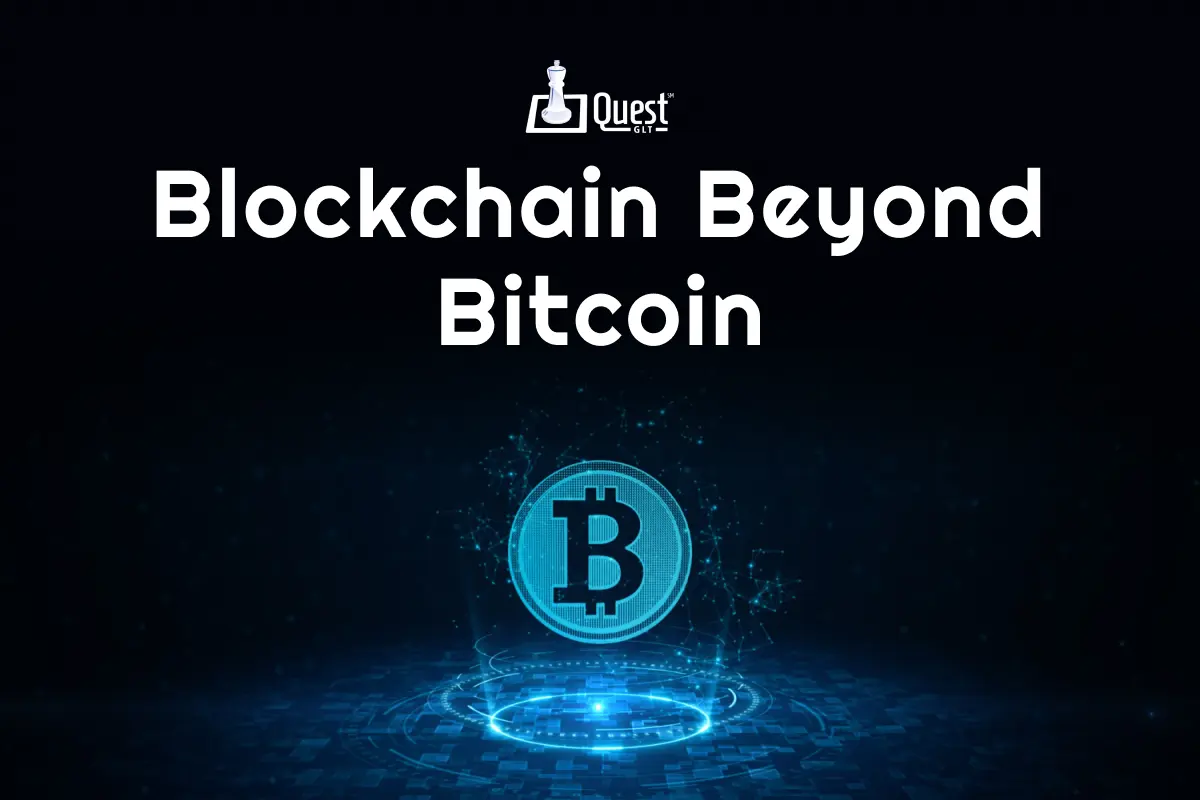
In a digitalized world, where innovations send out strands which are interconnected in increasing dimensions, there is one technology fiercely standing out as a factor of transformation that goes far beyond the borders of the cryptocurrency sphere. Get ready to explore an unfathomable universe of blockchain which promises things that are beyond the comprehension of the common world of Bitcoin. It is not only the liberation of technology but also the discovery of a never-seen domain of the changes that can reshape interrelation mechanisms, and the way we live and work.
Imagine a landscape where trust is automatized, contracts work by themselves and security reinvents its very existence. Blockchain, closely associated with the emergence of a new breed of currencies called cryptocurrencies, is again on top of the list, for it is believed that it will transform playing fields in industries and economies. Journeying deep into this topic, cast aside any preconception of blockchain; be prepared to be part of a revolutionary adventure far beyond the boundaries of the traditional financial industry. From DeFi or the tokenization of real-world assets, blockchain is changing in a direction we didn't expect and we will not miss one chapter. Strap on your seat belts, we are about to go on an exploration adventure that will bring us behind the curtains of Blockchain Beyond Bitcoin.
Understanding Blockchain Technology
Blockchain technology is based on the principles of decentralization, immutability, and transparency, and it is transforming the old hierarchical systems in numerous sectors found in different industries. Initially, blockchain Development makes sense of the data and storage processing by distributing the control among the network participants increasing the security and removing single points of the problem.
-
Decentralization and Security:
Decentralization allows no particular entity to control the entire network, minimising the chance of data manipulation or unauthorised access. Besides a distributed consensus, this technology has unparalleled security due to which it is hardly conquerable by hackers and not susceptible to scams.
-
Smart Contracts and Automation:
Smart contracts are contracts that are autonomous and are written into the code with their terms. These agreements work using bots which automatically execute and enforce predetermined conditions without the need for intermediaries thus speeding up the processes.
-
Transparency and Immutability:
Blockchain maintains a public and tamper-proof record of all the transactions, which is open to all the members of the network. While data on the blockchain cannot be altered or deleted, it ensures the integrity and authenticity of information stored on the blockchain through record-keeping. Transparency generates confidence and accountability in the community of users and the ecosystems within decentralized organizations.
Current Applications of Blockchain: Reshaping Industries and Becoming a Tool for Power Users
In this digital innovation, blockchain technology has gone beyond the initial connection to the cryptocurrency field and is now generating significant buzz in a variety of industries. We will explore the vast and intriguing world of blockchain applications that transform our engagement with money, information, and people.
Money Transfer:
Blockchain which is decentralised promises faster, more secure and affordable remittances across borders. The obstacles such as intermediary banks and currency conversions are eliminated making the transactions as easy and swift as they can be.
Financial Exchange:
The financial sector, in turn, is undergoing a revolutionary transformation in blockchain enabling quicker and more transparent financial transactions. It increases the efficiency of existing systems, making settlements faster and more effective.
Smart Contracts:
Smart contracts are the self-executing contracts introduced in the code. They automate and execute the terms of the contract, getting rid of the intermediaries and operating within a non-trustful environment which allows for safe transactions.
Lending:
The Blockchain makes P2P lending sites possible which allows individuals to borrow and lend without financial institutions. Such democratized access to credit, therefore, improves financial inclusion.
Personal Identity Security:
Blockchain technology is used to keep personal identities safe through the provision of a distributed and immutable ledger that stores identity reports. This reduces the chance of individuality theft & puts the control of data in the hands of users.
Healthcare:
In this industry, blockchain makes it possible for relevant parties to share medical details securely & transparently. This leads to the interoperability of information, prevention of fraud, & improvement of data integrity.
Real Estate:
Blockchain is leading to the transformation of the sector by creating a transparent and tamper-free records system. Smart contracts are very efficient & they make property transactions faster & more secure.
Supply Chain:
Blockchain improves supply chain transparency by registering each step of the supply chain on an unchangeable ledger. Such knowledge ensures the whole supply chain is transparent, reduces fraud, and builds trust between stakeholders.
In addition to the applications mentioned above, blockchain is certain to mature even more shortly, thus becoming a catalyst for a revolutionary transformation of multiple industries and providing people with a more secure and transparent environment to interact digitally.
Untapped Growth Opportunities of Blockchain Technology
The more we grasp the turbulent nature of blockchain technology, the clearer it is that the area for its application reaches beyond the traditional paths. We are embarking on an exploration to discover untapped growth potential, where the blockchain is the transforming force with new frontiers to revolutionize our engagement with the digital world.
Decentralized Finance (DeFi):
The evolution of decentralized finance is a signal of the prospects that exist in the blockchain ecosystem. From lending and borrowing to decentralized exchanges and yield farming, DeFi is opening opportunities for many individuals who were previously marginalized by the traditional systems.
Tokenization of Assets:
Imagine a world where physical and virtual assets of ownership are assets on the blockchain represented as tokens. This will allow for fractional ownership of real estate, art and other high-value assets, thus, making investments more accessible and liquid.
Integration with the Internet of Things (IoT):
The matrimonial union of blockchain and IoT produces harmony that increases the security and efficiency of the interconnected devices. Blockchain's immutable data storage secures data transmitted by IoT devices, which paves the way for the development of novel smart cities, supply chain logistics and other ideas.
Cross-Border Payments and Remittances:
Blockchain’s borderless nature is a game-changer for cross-border payments. By bypassing traditional banking institutions, it enables faster, cheaper, & more transparent recognition of international transactions, especially profitable remittances.
Blockchain in Government:
Decentralized management models provide an alternative to decision-making & translucence. Electoral procedures & governance systems can use blockchain to ensure intangible records and build trust in democratic processes.
Challenges and Considerations in the Blockchain Sphere
Navigating the potential landscape of blockchain technology has its own set of challenges & considerations. As we look ahead, it's essential to identify the challenges that may hinder the seamless integration of blockchain into mainstream applications.
Scalability Issues:
Blockchain networks have significant scaling problems. As usage grows, the ability to manage a rising number of transactions becomes an important consideration. Crashing a harmony between decentralisation & sustainability is a difficult job that the blockchain community is working on to secure the technology's long-term usefulness.
Regulatory Landscape:
The ever-evolving governing surroundings are a crucial factor influencing blockchain's mainstream acceptance. Government agencies worldwide are still developing frameworks & policies for this technology. Striking a balance between encouraging innovation and managing risks stays at a delicate equilibrium that necessitates coordination in the blockchain sector & legal organisations.
Environmental Concerns:
Energy consumption is connected with blockchain consensus algorithms such as Proof of Work (PoW), which raises environmental problems. As the world grows more conscious of ecological implications, the blockchain community is looking into eco-friendly alternatives, such as Proof of Stake (PoS), to help reduce its carbon footprint.
Future Outlook: Monitoring a Route Beyond Challenges.
Despite the challenges & concerns, the future of blockchain remains radiant. Innovations in scalability, interoperability, & sustainability are propelling the ecosystems ahead, clearing the way for wider adoption & practical applications. As it develops, we should expect increasing collaboration among industry actors, legislative clarity, & technological developments that open up new opportunities across several sectors.
-
Progress is being made to provide improved connectivity between blockchains and networks. This streamlines communication & data exchange, fostering a connected digital landscape.
-
The industry is moving towards resilience, adopting approved environmentally friendly methods & improving energy efficiency. These systems are critical to the development of an ecosystem that will inform ecology.
-
As the technology matures, it increases collaboration between blockchain & custom platforms. Industries such as finance, supply chain, & healthcare are poised for less seamless integration, unlocking higher efficiency & transparency.
Conclusion
In conclusion, blockchain’s disruptive impact extends beyond financial services, ushering in a new era of innovation and opportunity. As we navigate many uses and unexplored development potential, it becomes clear that blockchain’s influence transcends virtual currencies. From the decentralised economy to the supply chain, immutable ledger & infrastructure promise to alter industries, empower individuals & instil trust in our interconnected world.
Blockchain beyond Bitcoin symbolises a paradigm change, where clarity, security, & efficiency come together to reinvent existing associations and open up new frontiers of prospect. As we face problems & ideas on this transforming path, it is evident that the future holds assurances. Collaboration, creativity, & a strong dedication to its basic values are ready to transform economies, society, & the extreme material of our digital lives. Adopting this disruptive technology is more than an option; it is the entrance to a future full of possibilities & opportunities.
Visit Also:- Best Blockchain Consulting Services Company













